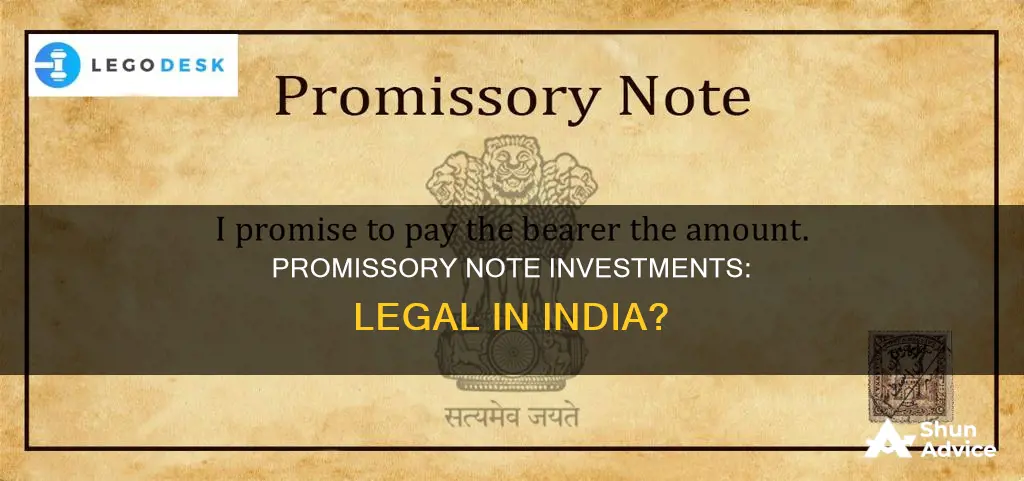
Promissory notes are a type of debt instrument that contains a written commitment by one party (the note's issuer or maker) to pay another party (the note's payee) a specific amount of money, either immediately or at a later date. In India, promissory notes are covered by the Negotiable Instruments Act of 1881, which ensures their negotiability and legal validity. They are widely used in both commercial and personal finance, providing a secure method for managing loans, payments, and investments.
While promissory notes can be legitimate investments, they are also often used in scams, with fraudsters persuading independent life insurance agents to sell them and then absconding with the money. As such, it is important for investors to be aware of the risks and do their due diligence before investing in promissory notes. This includes checking if the investment is registered with the SEC or a state securities regulator, verifying the seller's licence, and being cautious of promises of risk-free returns.
| Characteristics | Values |
|---|---|
| Legality | Legal in India under the Negotiable Instruments Act of 1881 |
| Definition | A written promise by one party (the note's issuer or maker) to pay another party (the note's payee) a definite sum of money, either on demand or at a specified future date. |
| Purpose | To act as a legally enforceable commitment, facilitating borrowing and lending by providing a clear record of the debt and its conditions. |
| Format | Must be in writing and contain a clear, unconditional promise to pay a specified sum. |
| Payment Terms | Payment must be made either on demand or at a fixed, determinable future date. |
| Amount | The specified amount must be clear and payable to the order or bearer, ensuring negotiability. |
| Signature | Requires the maker's signature to validate the commitment to pay. |
| Stamping/Government Approval | No need for stamping or government approval for validity. |
| Binding | Legally binding and enforceable, providing security for both lenders and borrowers. |
What You'll Learn

What is a promissory note?
A promissory note is a written promise by one party (the note's issuer or maker) to pay another party (the note's payee) a definite sum of money, either on demand or at a specified future date. It is a legally binding document that outlines the terms of a loan and binds the borrower to repay a sum of money to the lender within a certain time frame. The document also explains the terms and conditions of the loan, such as the principal debt amount, interest rate, maturity date, payment schedule, the date and place of issuance, and the issuer's signature.
A promissory note is a financial instrument that contains a written and signed promise between two parties to repay a sum of money in exchange for a loan or other financing. It is a form of debt instrument that represents a written promise on the part of the issuer to pay back another party. In terms of their legal enforceability, promissory notes lie somewhere between the informality of an IOU and the rigidity of a loan contract.
A promissory note is typically held by the party that is owed money. Once the debt has been fully paid, the note must be cancelled by the payee and returned to the issuer. If the borrower does not repay the loan, the lender can take possession of the collateral (if the promissory note is secured) or try to use standard debt-collection procedures (if the promissory note is unsecured).
In India, a promissory note is a legal instrument in which one party (the issuer) guarantees or promises in writing to pay a specific sum of money to the other (the payee) at a specific time or on the payee's demand, under specific circumstances. It is covered under the Negotiable Instrument Act, 1881, which provides a legal framework for the negotiability of these notes.
Cash in Investment Portfolios: Asset or Liability?
You may want to see also

What are the legal requirements for a promissory note in India?
In India, a promissory note is a legally binding document that falls under the governance of the Negotiable Instruments Act of 1881. This Act provides a legal framework, ensuring that promissory notes are negotiable, meaning they can be transferred by endorsement.
- It must be in writing, containing a clear and unconditional promise to pay a specified sum of money.
- The payment must be made either on demand or at a fixed and determinable future date.
- The specified amount must be clear and payable to a specific person, order, or bearer to ensure negotiability.
- It requires the maker's signature to validate the commitment to pay.
- No stamping or government approval is required for validity.
Additionally, promissory notes can be secured or unsecured. A secured promissory note includes details of the collateral that secures the debt, typically an asset such as property. On the other hand, an unsecured promissory note does not involve collateral, and the lender can use standard debt-collection procedures if the borrower defaults.
Capsim Process Management: Strategic Investment Initiatives for Success
You may want to see also

What are the different types of promissory notes?
There are several types of promissory notes, each serving a different purpose and bound by legal obligations. Here are the five most common types:
- Simple Promissory Note: This is a simple agreement where the borrower promises to repay a certain amount without complicated terms or conditions. Simple promissory notes are often used for personal loans between friends or family and are easy to understand and apply.
- Demand Promissory Note: This type of note offers flexibility to the lender, allowing them to demand repayment at any time. It is suitable for short-term financial arrangements as it provides the lender with the option to call in the loan on short notice.
- Instalment Promissory Note: Unlike a lump-sum payment, this type of note establishes a structured repayment plan. The borrower makes regular payments over a specified period, which is especially useful for larger loans such as mortgages or business loans.
- Secured Promissory Note: This type of note involves collateral, typically an asset of value, to secure the loan. The lender has the right to seize the specified collateral and recover the outstanding amount in the event of default by the borrower.
- Unsecured Promissory Note: Unsecured promissory notes do not involve specific collateral but are based on the borrower's creditworthiness. These notes are common for personal loans and credit arrangements but may have higher interest rates to compensate for the higher risk.
In addition to these five types, promissory notes can also be categorised as:
- Personal Promissory Notes: These are typically loans taken from family or friends, and a promissory note demonstrates the trust between the borrower and the lender.
- Commercial Promissory Notes: These are often similar to personal notes and are used when dealing with commercial lenders such as banks.
- Real Estate Promissory Notes: These notes are similar to commercial notes in terms of non-payment consequences. The lender has the right to keep the property until the debt is cleared, but this type of note can be risky as it makes public essential details that could hinder the borrower's credit history.
- Investment Promissory Notes: These notes are occasionally used to raise funds for businesses and are managed by securities laws. They include terms and conditions related to investment returns.
- Corporate Credit Promissory Notes: These are a form of short-term borrowing often used by companies to manage cash flow issues.
- Student Loan Promissory Notes: Students sign these notes to formalise their debt and agree to the terms and conditions laid out by the lender.
- Informal Promissory Notes: Also known as personal promissory notes, these are used for borrowing money between individuals such as friends or family members. They may not include as many repayment stipulations as more formal promissory notes.
- Commercial Paper: Commercial paper, or CP, is a short-term financial instrument used by businesses to raise capital, usually over a one-year period.
Invest to Grow: Why Smart Investors Shun Savings Accounts
You may want to see also

How do promissory notes work?
A promissory note is a written promise by one party (the note's issuer or maker) to pay another party (the note's payee) a definite sum of money, either on demand or at a specified future date.
A promissory note is a legally binding contract in which the debtor promises to repay a designated amount to the creditor, adhering to agreed-upon terms. It is a financial instrument that contains a written and signed promise between two parties to repay a sum of money in exchange for a loan or other financing.
A promissory note typically contains all the terms pertaining to the indebtedness, such as the principal amount, interest rate, maturity date, date and place of issuance, and issuer's signature. It is usually held by the party that is owed money and once the debt has been fully paid, the note must be cancelled by the payee and returned to the issuer.
In terms of their legal enforceability, promissory notes lie somewhere between the informality of an IOU and the rigidity of a loan contract. An IOU merely acknowledges a debt and the amount one party owes another. A promissory note includes a promise to pay on demand or at a specified future date, in addition to steps required for repayment (like the repayment schedule).
Promissory notes are covered under the Negotiable Instruments Act of 1881 in India and are widely used in both commercial and personal finance. They are a reliable and enforceable method of securing short-term finance and settling debts.
Promissory notes are legal contracts that consist of a borrower's commitment to repay a predefined amount to the lender per agreed terms. The note comprises major details like the principal amount, interest rates, repayment method, etc. The promissory note is signed by both parties, which makes it a binding agreement. The note is legally applicable until the borrower pays back the sum. It offers a legal cover to the lender in case the loan becomes a default.
A promissory note encompasses crucial details defining a financial agreement. Here's what it typically comprises:
- Principal amount loaned
- Obligation for repayment
- Agreed penalties for defaults or late payments
- Signatures from both parties validate its legal standing, ensuring transparency and mutual understanding
Types of promissory notes
There are five types of promissory notes:
- Simple Promissory Note: A simple agreement that defines the borrower's promise to repay a certain amount without complicated terms or conditions.
- Demand Promissory Note: This type of note provides flexibility to the lender, allowing them to demand repayment at any time.
- Instalment Promissory Note: Unlike a lump-sum payment, an instalment promissory note establishes a structured repayment plan.
- Secured Promissory Note: This type offers collateral to secure the loan, typically an asset of value.
- Unsecured Promissory Note: Unsecured promissory notes lack specific collateral but include the borrower's creditworthiness.
What Keeps an Investment Managing Director Up at Night?
You may want to see also

What happens if a promissory note is not repaid?
A promissory note is a legally binding document that outlines the terms of a loan and binds the borrower to repay the lender within a certain time frame. Failure to repay the loan can have serious consequences for the borrower.
If the borrower defaults on the loan, the lender has several options to enforce the agreement. The first step is usually to send a formal demand letter to the borrower, outlining the default and requesting payment within a specified timeframe. If the borrower fails to comply, the lender may initiate legal proceedings, such as filing a lawsuit to recover the owed amount, interest, and fees. The lender may also seek remedies such as garnishing the borrower's wages or placing liens on their property, subject to court approval.
In the case of a secured promissory note, where the borrower has provided collateral, the lender has the right to seize and liquidate the collateral to recover the outstanding debt. This could include the borrower's property, vehicle, or other assets.
To mitigate the risk of non-repayment, lenders may also include late payment penalties or renegotiate the terms of the loan. In some cases, the lender may choose to initiate legal actions immediately, especially if there is a risk of the borrower becoming insolvent.
It is important to note that the legal process for debt recovery may vary depending on the state or territory regulations in India. Additionally, any debt collection activities must be fair, flexible, and reasonable, and lenders should be cautious to avoid unethical behaviour that could lead to legal consequences.
Investment Portfolio AES: A Comprehensive Guide
You may want to see also
Frequently asked questions
A promissory note is a written promise or contract by one party (the note's issuer or maker) to pay another party (the note's payee) a definite sum of money, either on demand or at a specified future date.
Promissory notes are legal in India and are covered under the Negotiable Instruments Act of 1881, which ensures their negotiability and legal validity.
Promissory notes must be in writing and contain a clear, unconditional promise to pay a specified sum of money. They can be payable on demand or at a fixed future date and must include the signature of the maker to validate the commitment to pay.
While promissory notes can be legitimate investments, they are often used in scams targeting the general public, especially the elderly. It is important to verify the legitimacy of the company issuing the promissory note, ensure it is registered with the relevant authorities, and be cautious of promises of high returns with low risk.







